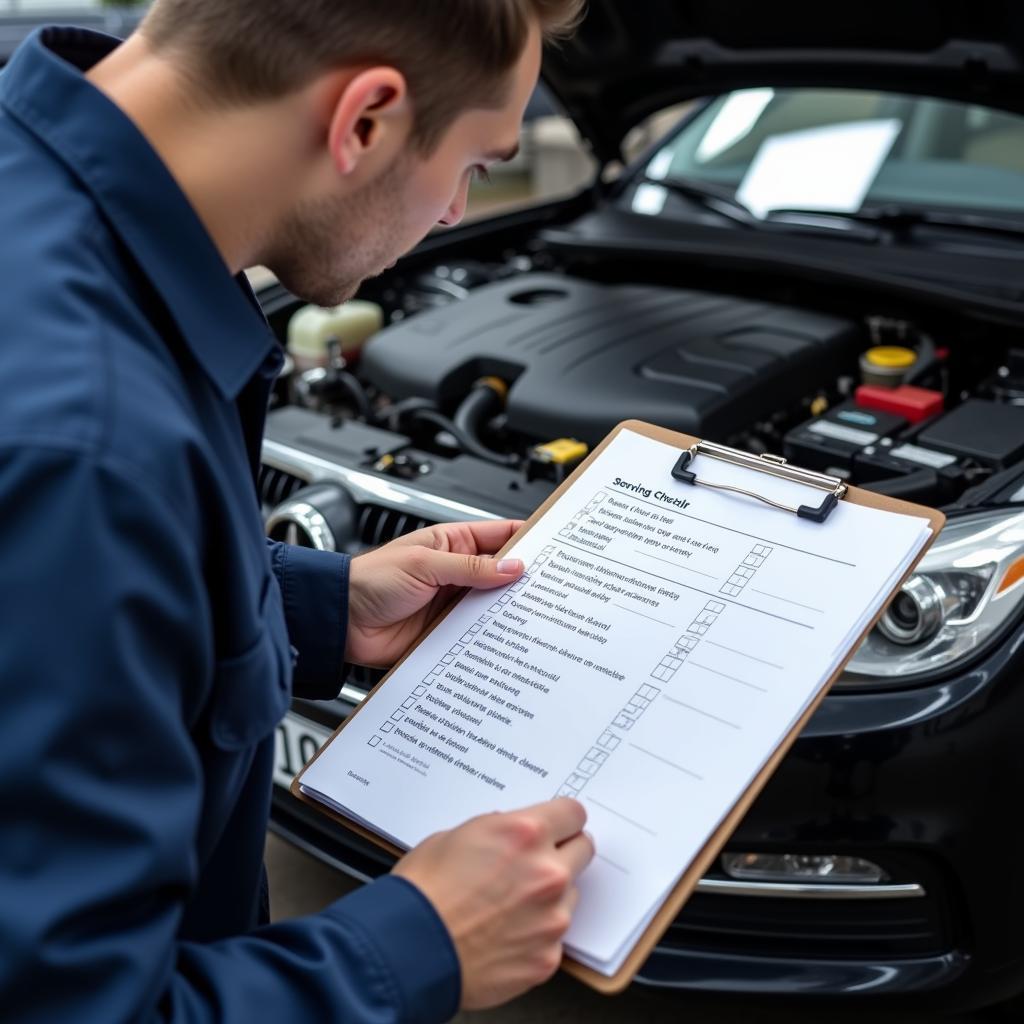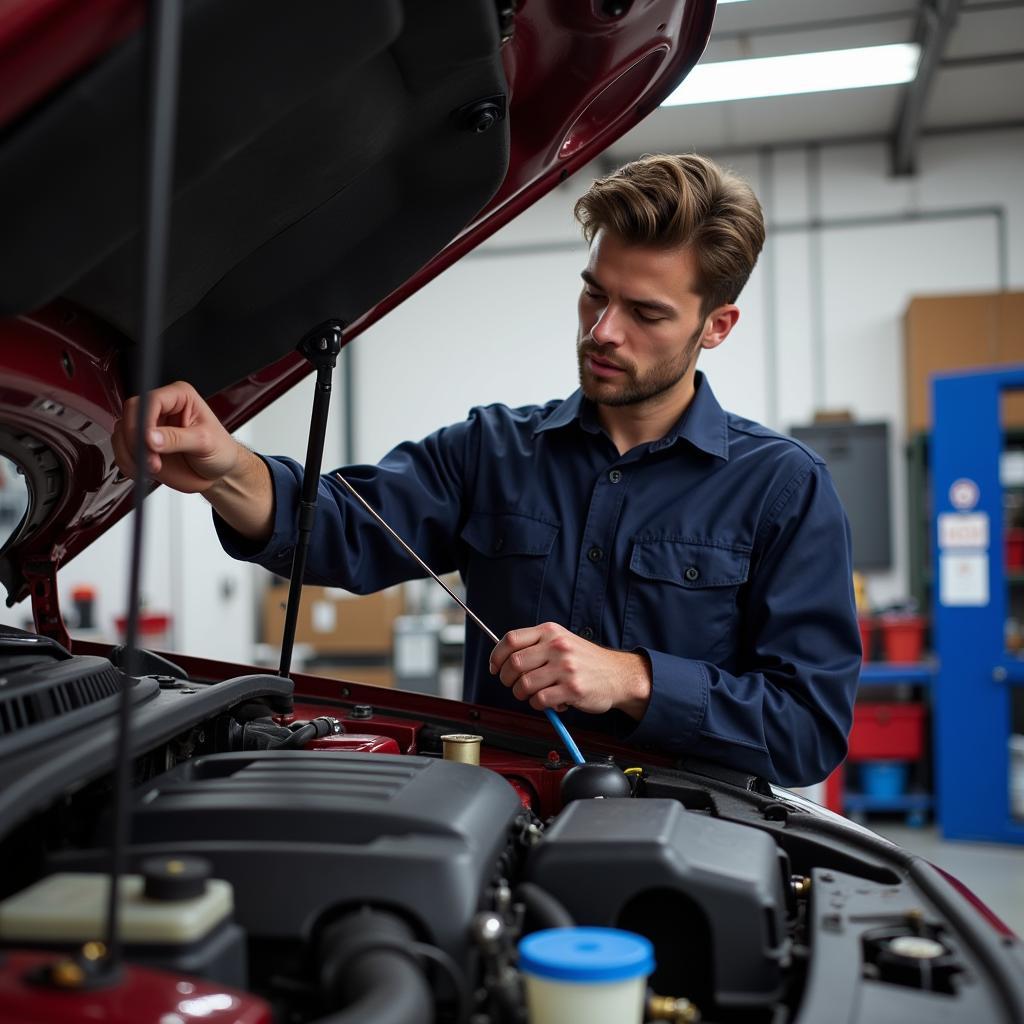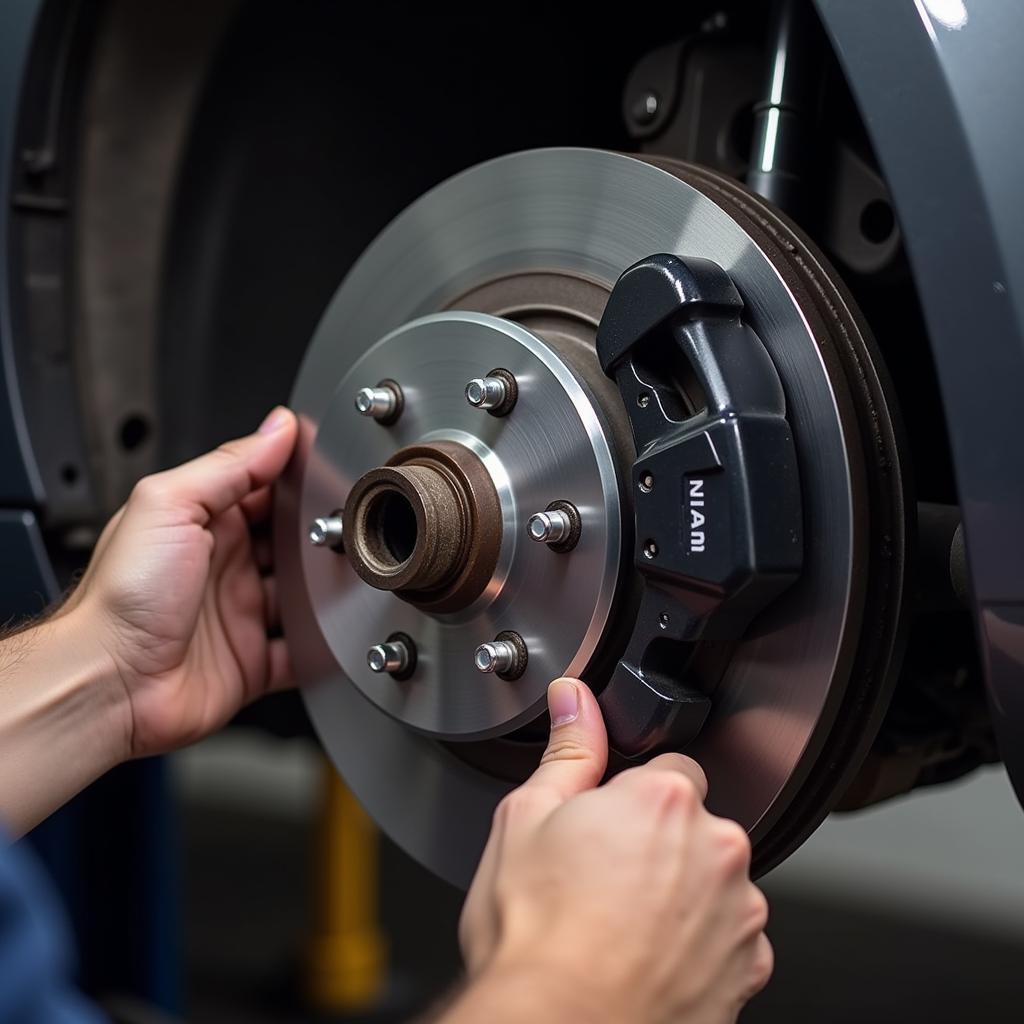What Happens at a Car Service?
When you take your car for a service, you’re making an investment in its longevity, performance, and your safety. But what exactly happens during a car service? Many car owners are in the dark about the intricacies of this essential maintenance routine. This article delves into the comprehensive world of car servicing, demystifying the process and highlighting its importance.
 Car Service Checklist
Car Service Checklist
Understanding Car Service: Beyond the Basics
A car service is much more than just an oil change. It’s a series of inspections, adjustments, and replacements that ensure your vehicle runs smoothly and safely. Think of it as a health checkup for your car, designed to identify and address minor issues before they escalate into major problems.
What Happens During a Car Service?
While the specifics may vary based on your car’s make, model, age, and the type of service required, here’s a general overview of what you can expect:
1. Fluid Level Checks and Top-Ups
Your mechanic will begin by checking the levels of essential fluids, including:
- Engine oil: Lubricates the engine’s moving parts, reducing friction and wear.
- Coolant: Regulates the engine’s temperature, preventing overheating.
- Brake fluid: Transmits force from the brake pedal to the brakes, ensuring safe stopping.
- Power steering fluid: Assists in steering, making it easier to turn the wheel.
- Windshield washer fluid: Cleans the windshield for optimal visibility.
If any of these fluids are low, the mechanic will top them up to the recommended levels.
 Mechanic Checking Engine Oil
Mechanic Checking Engine Oil
2. Filter Replacements
Filters play a crucial role in keeping your car running smoothly by trapping dirt and debris that can damage vital components. During a service, the mechanic will typically replace:
- Oil filter: Removes contaminants from the engine oil, ensuring optimal lubrication.
- Air filter: Prevents dust and debris from entering the engine, maintaining clean airflow for combustion.
- Cabin air filter: Cleans the air entering the cabin, improving air quality and preventing allergens.
3. Tire Inspection and Rotation
Your tires are your car’s only point of contact with the road, making their condition paramount for safety and handling. The mechanic will:
- Check tire pressure: Ensures tires are inflated to the correct pressure for optimal performance and fuel efficiency.
- Inspect tire tread depth: Determines if the tires have sufficient tread for safe grip and handling.
- Examine tires for damage: Looks for cuts, bulges, or uneven wear that could compromise safety.
- Rotate tires: Moves the tires to different positions on the car to promote even wear and extend their lifespan.
4. Brake Inspection
Your brakes are arguably the most critical safety feature of your car. The mechanic will inspect:
- Brake pads and discs/drums: Measures their thickness to determine remaining lifespan and identify potential issues.
- Brake lines and hoses: Checks for leaks or damage that could compromise braking performance.
- Brake fluid condition: Assesses the fluid’s color and consistency, as contaminated fluid can reduce braking efficiency.
 Mechanic Inspecting Brakes
Mechanic Inspecting Brakes
5. Battery Check
A healthy battery is essential for starting your car and powering its electrical components. The mechanic will:
- Inspect battery terminals for corrosion: Cleans any corrosion to ensure a strong electrical connection.
- Test battery voltage: Determines if the battery is holding a charge and functioning correctly.
6. Lights and Electrical System Check
The mechanic will inspect all exterior lights, including headlights, taillights, brake lights, turn signals, and hazard lights, ensuring they are functioning correctly. They will also check the condition of the wiring and connections.
7. Steering and Suspension Check
This inspection focuses on components that affect your car’s handling and ride comfort. The mechanic will check for:
- Worn or damaged suspension components: Includes shocks, struts, springs, and control arms.
- Loose steering components: Includes tie rods, ball joints, and the steering rack.
8. Exhaust System Check
The mechanic will inspect the exhaust system for leaks, damage, or excessive rust. They will also check the condition of the catalytic converter, which reduces harmful emissions.
9. Diagnostic Scan
Modern cars are equipped with onboard computers that monitor various systems. The mechanic will use a diagnostic scanner to retrieve any stored fault codes, which can indicate potential problems that require attention.
Why is Car Servicing Important?
Regular car servicing offers numerous benefits, including:
- Safety: Ensures your car is safe to drive by identifying and addressing potential safety hazards.
- Reliability: Reduces the likelihood of breakdowns and unexpected repairs.
- Performance: Keeps your car running at peak performance, improving fuel efficiency and handling.
- Longevity: Extends the lifespan of your car by preventing premature wear and tear.
- Resale Value: A well-maintained car with a documented service history commands a higher resale value.
what happens if i don’t service my car
Types of Car Services
Car services are typically categorized based on mileage or time intervals, such as:
- Interim Service: Usually recommended every 6,000 miles or 6 months.
- Full Service: Generally recommended every 12,000 miles or 12 months.
- Major Service: Typically required every 24,000 miles or 24 months.
The specific services included in each type may vary depending on the manufacturer’s recommendations.
what happens if i don’t service my leased car
Choosing the Right Car Service Provider
Selecting a reputable and trustworthy car service provider is crucial. Here are some factors to consider:
- Certifications and Experience: Look for mechanics certified by reputable organizations.
- Customer Reviews: Check online reviews and ratings to gauge customer satisfaction.
- Transparency: Choose a provider that clearly explains the services they offer and their pricing.
- Communication: Opt for a provider that communicates openly and honestly about your car’s needs.
what happens when you don’t service your car
Conclusion
Understanding What Happens At A Car Service empowers you to make informed decisions about your vehicle’s maintenance. By adhering to a regular service schedule and choosing a trusted mechanic, you can ensure your car remains safe, reliable, and performing at its best for years to come. Remember, regular car servicing is not just an expense; it’s an investment in your peace of mind and the longevity of your vehicle.
FAQs
1. How often should I service my car?
The frequency of car servicing varies depending on the make, model, and age of your car, as well as your driving habits. Refer to your owner’s manual for the manufacturer’s recommended service intervals.
2. What is the difference between a full service and a major service?
A full service is a comprehensive inspection and maintenance service that covers most essential checks and replacements. A major service is more extensive and includes additional checks and replacements for components that experience wear and tear over a longer period.
3. Can I service my car myself?
While some basic maintenance tasks, like checking fluid levels and changing air filters, can be performed by car owners with some mechanical knowledge, it’s generally recommended to have your car serviced by a qualified mechanic, especially for more complex procedures.
4. How much does a car service cost?
The cost of a car service varies depending on the type of service, the make and model of your car, and the labor rates in your area.
5. What happens if I don’t service my car regularly?
Neglecting regular car servicing can lead to reduced performance, decreased fuel efficiency, increased wear and tear on components, and a higher risk of breakdowns.
6. How do I find a reputable car service provider?
Ask for recommendations from friends, family, or online communities. Check online reviews and ratings. Look for certifications and experience.
7. What should I do if my car’s check engine light comes on?
If your car’s check engine light illuminates, it’s essential to have it inspected by a qualified mechanic as soon as possible. This warning light could indicate a minor issue or a more serious problem that requires immediate attention.
For more information on car servicing or to schedule an appointment with a trusted mechanic, please visit our website or contact us at [WhatsApp: +1(641)206-8880, Email: [email protected]]. Our team of experts is available 24/7 to answer your questions and provide exceptional car care.

